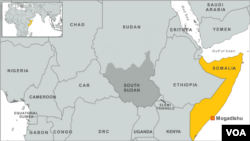ADDIS ABABA, ETHIOPIA —
An international contact group on Somali piracy is developing the foundations for a legal framework so pirates can be prosecuted, convicted and serve their sentences in Somalia.
The Contact Group on Piracy off the Coast of Somalia is developing a regional prosecution model for Somali pirates that are captured at sea. The legal framework also will include guidelines for the future Somali police and Coast Guard on arresting pirates in international waters.
John Steed of the United Nations Political Office for Somalia said there are many challenges, as Somalia is a recovering state.
“Somalia doesn’t have the legal framework that the international community would recognize, so most of the prosecutions take place in countries like the Seychelles and Kenya and elsewhere in the region,” said Steed.
The Contact Group, established in 2009, includes more than 80 countries and international organizations such as the African Union, Arab League, European Union, and NATO. The group's primary goals are to end piracy of the coast of Somalia and to ensure that pirates are brought to justice.
Members meet twice a year in plenary session, but working groups meet regularly in different countries to develop and implement their policies and programs.
There currently are more than 1,200 Somali pirates who have been taken into custody and detained in 21 countries. Prisons have been built in different Somali regions, but overall capacity is still low, and prosecutions against accused pirates in Somalia are rare.
James Hughes of Britain's Foreign and Commonwealth Office said the ultimate goal is to have Somali pirates serve their sentences in their own country.
“In the shorter term those convicted in regional states can be returned to Somalia to serve their sentences in Somali prisons. And in the longer term of course, is to develop court and prison capacity in Somalia so that the Somali administration can bring those convicted of piracy to justice at home," said Hughes. "Obviously this will not happen overnight, this is a long-term process.”
Pirate attacks off Somalia have dropped sharply in the past couple of years, as international navies patrol the coast and more ship owners install armed guards aboard their vessels.
The Contact Group said that piracy in the Gulf of Aden and nearby waters, however, is an ongoing and serious treat to the safe delivery of humanitarian aid to Somalia, and to the safety of commercial maritime routes and to fishing activities.
According to the International Maritime Bureau, 75 ships were attacked off Somalia during 2012, and 14 were hijacked.
The Contact Group on Piracy off the Coast of Somalia is developing a regional prosecution model for Somali pirates that are captured at sea. The legal framework also will include guidelines for the future Somali police and Coast Guard on arresting pirates in international waters.
John Steed of the United Nations Political Office for Somalia said there are many challenges, as Somalia is a recovering state.
“Somalia doesn’t have the legal framework that the international community would recognize, so most of the prosecutions take place in countries like the Seychelles and Kenya and elsewhere in the region,” said Steed.
The Contact Group, established in 2009, includes more than 80 countries and international organizations such as the African Union, Arab League, European Union, and NATO. The group's primary goals are to end piracy of the coast of Somalia and to ensure that pirates are brought to justice.
Members meet twice a year in plenary session, but working groups meet regularly in different countries to develop and implement their policies and programs.
There currently are more than 1,200 Somali pirates who have been taken into custody and detained in 21 countries. Prisons have been built in different Somali regions, but overall capacity is still low, and prosecutions against accused pirates in Somalia are rare.
James Hughes of Britain's Foreign and Commonwealth Office said the ultimate goal is to have Somali pirates serve their sentences in their own country.
“In the shorter term those convicted in regional states can be returned to Somalia to serve their sentences in Somali prisons. And in the longer term of course, is to develop court and prison capacity in Somalia so that the Somali administration can bring those convicted of piracy to justice at home," said Hughes. "Obviously this will not happen overnight, this is a long-term process.”
Pirate attacks off Somalia have dropped sharply in the past couple of years, as international navies patrol the coast and more ship owners install armed guards aboard their vessels.
The Contact Group said that piracy in the Gulf of Aden and nearby waters, however, is an ongoing and serious treat to the safe delivery of humanitarian aid to Somalia, and to the safety of commercial maritime routes and to fishing activities.
According to the International Maritime Bureau, 75 ships were attacked off Somalia during 2012, and 14 were hijacked.
